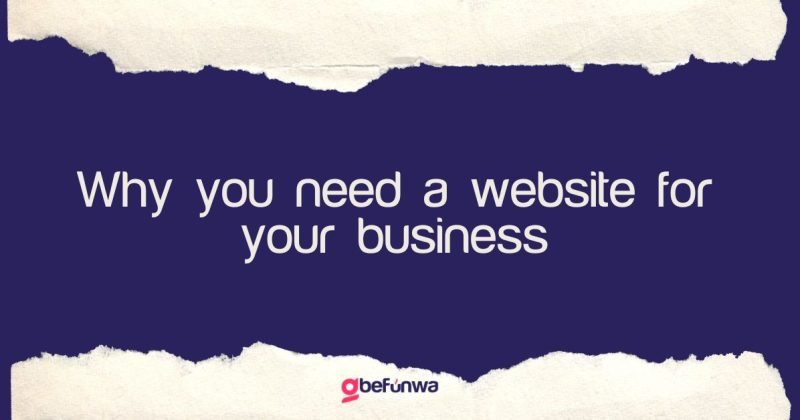
Running a business solely on social media might have been appealing at some point in time, but it is less than two months into 2024, and that is soo 2010 behavior. In today’s digitally-driven world, having a website is not just an option; it’s a necessity. Having a website for your business, either an online, or a website showcasing your service and booking options sets you apart from the crowd, does well for your brand identity. It also helps improve sales and helps you gather enough data for growth.
Whether you’re an aspiring entrepreneur, a small business owner, or an established company, the online landscape offers an abundance of opportunities, and your website is your passport to this virtual world. In this comprehensive guide, we’ll delve deep into why you need a website, explore the pitfalls of selling solely on social media, and unravel the advantages of using WooCommerce for your online store. Let’s dive in.
Your website is your digital storefront, the place where customers can learn about your business, products, and services. It provides a sense of legitimacy and professionalism that social media alone can’t match. A well-designed, user-friendly website instills trust in potential customers, making them more likely to engage with your brand. But apart from credibility and trust, it also provides:

a. 24/7 Accessibility
Unlike a physical store with set opening hours, your website is always open. It caters to customers from different time zones, allowing them to explore your offerings at their convenience. This accessibility can lead to increased sales and broader customer reach.
b. Global Reach
The internet has no geographical boundaries. With a website, you can extend your reach to a global audience. You’re not limited by your physical location, opening up new avenues for growth and expansion.
c. Showcase Your Brand
Your website is a canvas where you can express your brand’s identity and values. Through high-quality content, visual design, and user experience, you can convey your unique brand story, leaving a lasting impression on visitors.
d. Control Over Your Online Destiny
When you own a website, you have full control over its content, design, and functionality. You’re not at the mercy of changing social media algorithms or policies. Your website is your domain, and you call the shots.
e. Data and Analytics
Websites provide valuable insights into user behavior. With tools like Google Analytics, you can track visitor demographics, preferences, and interactions. This data empowers you to make informed decisions and optimize your online presence.
f. SEO Benefits
Search engine optimization (SEO) is crucial for online visibility. A website offers greater SEO opportunities than social media profiles. By optimizing your site for search engines, you can rank higher in search results, driving organic traffic.
While selling on social media is not a bad idea, doing so exclusively with no plans for scaling up may just turn around to be a thorn in the flesh in the long run. This is because.
a. Limited Brand Control
When you sell exclusively on social media, you’re confined to the platform’s templates and design options. This limits your ability to create a unique and memorable brand identity.
b. Limited Data and Insights
Social media platforms provide some analytics, but they often lack the depth and customization of website analytics. Without detailed data, you’re missing out on critical information about your audience and their preferences.
c. Competitive Noise
Social media is saturated with content and competition. It can be challenging to stand out in the constant stream of posts and ads, making it harder to capture your audience’s attention.
d. Changing Algorithms
Social media platforms frequently update their algorithms, impacting the visibility of your content. What worked yesterday might not work today, leaving your marketing strategies in constant flux.
e. Lack of Professionalism
While social media is a valuable tool, it might not convey the same level of professionalism as a dedicated website. Customers may question the legitimacy of businesses that rely solely on social media for their online presence.
….And what happens if you ever lose your account?
If you’ve been looking to create an online store, WooCommerce is your surest bet. WooCommerce is a game-changer for businesses looking to sell online. Seeing as it is a WordPress Plugin, creating , customizing and having one is as easy as ABC. You can check out our earlier post about how to create your own WooCommerce page. Wondering why you should use WooCommerce?
a. User-Friendly
WooCommerce is user-friendly, making it accessible for beginners and experts alike. You don’t need a tech background to create and manage your e-commerce store.
b. Customization
You have complete control over your online store’s design and functionality. WooCommerce offers a wide range of themes and plugins, allowing you to tailor your store to your brand’s unique needs.
c. SEO-Friendly
WooCommerce is designed with SEO in mind. You can optimize your product pages, meta descriptions, and URLs for search engines, boosting your online visibility.
d. Scalability
Whether you’re a small business or a large enterprise, WooCommerce can scale to accommodate your needs. You can add products, expand your catalog, and handle increased traffic without a hitch.
e. Integration and Plugins
WooCommerce seamlessly integrates with various payment gateways, shipping options, and third-party plugins. This flexibility ensures a smooth shopping experience for your customers.
f. Cost-Effective
WooCommerce is cost-effective, particularly for startups and small businesses. You can create a professional e-commerce site without a hefty budget.
g. Customer Support
With a vast community and extensive resources, you’ll find ample support for your WooCommerce journey. Whether you have technical questions or need advice, help is just a click away.
Now that you know why you should have a website for your business, to establish a strong online presence, it’s crucial to define and maintain a consistent brand identity across your website. This identity should reflect your values, mission, and what makes your brand unique. Also, by creating compelling and informative content you not only engage your audience but also encourage them to take action, whether it’s making a purchase, signing up, or learning more. Given the ever-growing number of mobile users, optimize your website for mobile devices to reach a broader audience. Don’t forget to implement robust security measures to protect customer data, building trust and credibility. Lastly, embrace social media as a powerful tool to complement your website, creating a holistic online presence that connects with your audience and strengthens your brand’s visibility and engagement
Deborah Oludimu is an experienced content writer with 3+ years of experience. She is skilled in research, writing, and editing to produce high-quality, engaging content across industries. Deborah is passionate about creating content that informs and inspires
© 2026 GBEFUNWA.COM. All rights reserved.
The WordPress® trademarks are the intellectual property of the WordPress Foundation, and the Woo® and WooCommerce® trademarks are the intellectual property of WooCommerce, Inc. Uses of the WordPress®, Woo®, and WooCommerce® names in this website are for identification purposes only and do not imply an endorsement by WordPress Foundation or WooCommerce, Inc. gbefunwa is not endorsed or owned by, or affiliated with, the WordPress Foundation or WooCommerce, Inc.